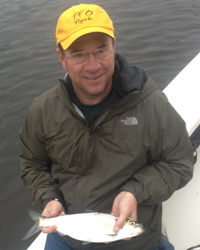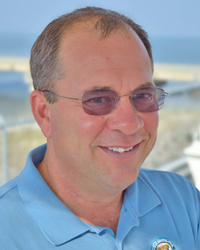Alum serves as Director of NC Division of Marine Fisheries
In his job as Director of the North Carolina Division of Marine Fisheries, VIMS alumnus Louis Daniel must make carefully considered decisions every day. But he says the best decision in his own career was made without a lot of forethought.
A 1995 graduate of the Ph.D. program at the Virginia Institute of Marine Science, Daniel now holds the top fisheries post in the state—a position he wouldn’t be in had he not selected a particular course as an undergraduate. 
A native North Carolinian, Daniel was set to follow in his father’s footsteps and become an orthopedic surgeon. While pursuing a pre-med track at Wake Forest University, Daniel got closed out of an anatomy class and was forced to choose between plant taxonomy or invertebrate zoology. Without a particular interest in either, he closed his eyes and let his finger do the choosing.
“Blindly selecting invertebrate zoology was the best decision I ever made in my life,” says Daniel. “It was like a light bulb went off. It hit me that this is what I want to do—I want to be a marine scientist. I fell head over heels in love with the subject.”
As Director of the NCDMF—a Division of the North Carolina Department of Environment and Natural Resources—Daniel says his main priority is to accomplish the Division’s mission of protecting and enhancing marine resources for the state of North Carolina.
“My job is becoming increasingly difficult as more people move to the beach and population increases,” he says. “The most challenging part is working with the competing user groups of commercial and recreational fisheries. The commercial fishers are looking for quantity, and recreational fishers are looking for quality, so you have to go down the middle.”
While his main focus is on fisheries in his home state, Daniel and his team often work with fisheries departments in Virginia. “I’m always working to collaborate and communicate with Virginia fisheries as best I can because we share a fish population,” says Daniel. “We recognize the joint water issues we have between striped bass, dogfish, flounder, and so on. We recognize that we benefit a lot from the fish that come out of Chesapeake Bay.”
As a VIMS graduate, it is almost impossible to not feel some sort of an attachment to the Bay—and Daniel is no exception, having spent countless hours collecting samples on the estuary.
“My research at VIMS focused on why we weren’t seeing any baby black drum in the Bay,” he says. “I was looking at the abundance of plankton predators, and how that coincided with the spawning events of black drum.”
During his time at VIMS, Daniel worked closely with Professor John Graves using genetic techniques to identify fish eggs. “Without a lot of prior genetic experience, Louis came into the lab, learned the techniques, and turned out a wonderful paper,” says Graves. “He has always been comfortable talking to both commercial and recreational fisherman, and has a great understanding of the science.”
Daniel acquired a solid background in estuary fisheries ecology while earning his Master’s at the College of Charleston, but he wanted to become an expert on estuarine ecology at all stages. “When I started at VIMS, I knew the ecology of adult and juvenile fish, but I didn’t know anything about the egg and larval stages,” he says. “I wanted a broad understanding from eggs to spawning, and all the way through to maximum age.”
“I’m not at all surprised to see Louis as the Director of NCDMF,” says Graves. “It has been very gratifying to follow his career. He was a real character as a graduate student, and still is today.”
In between graduating from VIMS and becoming Director of NCDMF, Daniel worked for the U.S. Fish and Wildlife service for one year before being hired at the Division as a biological supervisor in 1995. After serving as the executive assistant to the director for nine years, he took over the position when the previous director retired.
As the first person to ever move through the ranks and become director, Daniel says graduate students and young professionals always need to be thinking of ways they can improve their resume. “I am constantly working on building my resume, and I am very proud to have VIMS on there,” he says.
Daniel says he benefited greatly from the relationship he shared with his advisors while at VIMS. While he entered as a student of the late Professor of Marine Science John Olney, Daniel graduated as a student of Emeritus Professor Jack Musick due to a change in the structure of the academic program. “I gained so much from some of the discussions I had with John and Jack,” he says. “It is so important to be involved with the faculty, and I took so much away from that relationship.”
Daniel—who is happy to be back in his native North Carolina with his wife and two children—says the times he spent at VIMS were some of the best times of his life.

